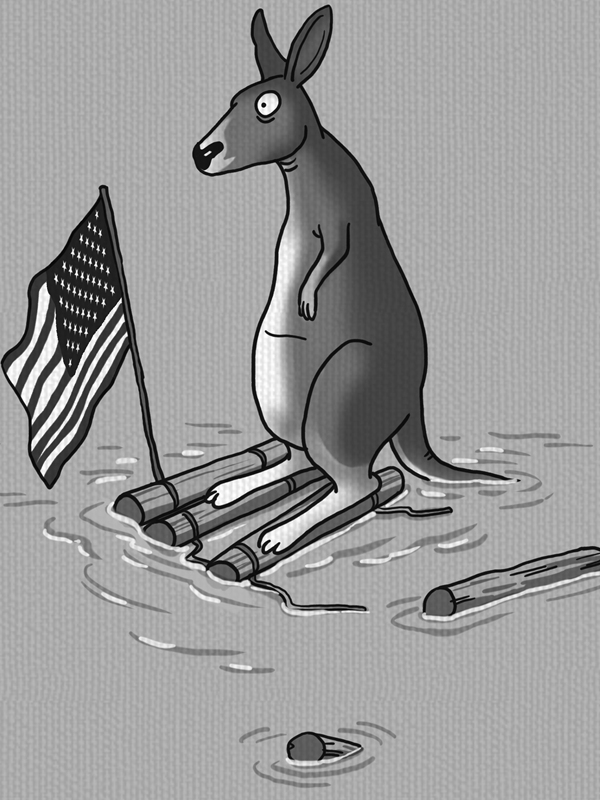Bilateral ties increasingly toxic thanks to Canberra’s policies
By Chen Hong Source:Global Times Published: 2020/5/21 19:03:40

Illustration: Liu Rui/GT
During the recent rows over China's imposition of anti-dumping tariffs on Australian barley, and suspension of beef import from four Australian abattoirs, Canberra accused Beijing of not behaving like a comprehensive strategic partners.
However, Australia's Prime Minister Scott Morrison obviously did not have the partnership on his mind when he started to push for an international inquiry of China's handling of the COVID-19 outbreak. This surprise move was initiated by the Morrison administration without any diplomacy and consultation in advance. Is that really the spirit of partnership?
The so-called independent inquiry was basically part of US President Donald Trump's smear campaign to incriminate and blame China for the outbreak. It aided and abetted Trump's ploy to divert domestic and international attention away from his administration's botched handling of the pandemic.
Canberra also openly echoed Washington's rhetoric to support the island of Taiwan to join the World Health Organization - an international body for sovereign states only. This act is in flagrant violation of the one-China principle, the cornerstone of the diplomatic relationship between China and Australia.
Do these acts of collusion with Trump sound like a proper way for Australia to treat its comprehensive strategic partner?
Nowadays, Canberra seems to be viewing China with a dark and sinister lens instead of tinted glasses.
When the outbreak began, Australia instantly readjusted the threshold of the Foreign Investment Review Board examination for overseas proposals to $0. This was based on the feared fantasy that China would take advantage of the country's economic difficulties "to snap up strategically important assets" in Australia.
Although Australia achieved a record high of exports to China in 2019, and Chinese students and tourists have been contributing enormously to Australia's financial revenue for many years, Australian political figures and media outlets have been incessantly urging for the necessity of decoupling with China. They have been exaggerating about the so-called over-dependence on the Chinese market. They advocate diversifying their trade partnerships, as well as sources of tourists and students.
In other words, it is Australia that has been making threats and promoting the idea of ceasing mutually beneficial economic, trade and investment exchanges with China.
In recent years, Canberra has been tirelessly censuring Beijing of engaging in aggressive policies that it claims are threatening the security and sovereignty of Australia. When Australia sent its frigate HMAS Parramatta to exercise with the US Navy in the South China Sea, did it ever cross Canberra's mind that it was taking threatening approaches that are interpreted in Beijing as jeopardizing China's sovereignty?
In other words, when Australia initiated hostile initiatives to vehemently attack China and made offensive remarks about China's domestic and international policies, it claimed to be exercising its independence.
By contrast, when China in turn makes statements to justify itself, Australia accuses China of acting assertively and aggressively like "wolf warriors." This is unfair and hypocritical.
There has indeed been increasing frustration here in China over Australia's unremitting demonstration of hostility. Australia has not acted as a comprehensive strategic partner. It takes advantage of economic and trade benefits with China - yet relentlessly and groundlessly attacks the latter in collaboration with Washington. It indeed enjoys undertaking the Washington course of action to deter, contain and suppress China's development as a way to help maintain US hegemony.
It is a fact our bilateral relationship is becoming increasingly toxic thanks to Canberra's unyielding efforts.
This is bound to affect a positive and conducive climate which is indispensable for proactive trade and cultural exchanges. These latter have been the keystone of our relationship that is sorrowfully at the lowest ebb ever. This position is detrimental to the interest of both countries.
Canberra's series of reckless steps to pick fights with Beijing reveals a lack of strategic and sensible perceptions of the international reality. By needlessly associating itself with the anti-China campaign led by the US, Australia has puts its own interests at stake.
It is easier to break than make a relationship. The China Australia relationship has been undergoing a downward spiral and this deleterious course has to be stopped. Canberra needs to be sensible and constructive, and work in conjunction with China to steer the bilateral relationship back to its right track.
The COVID-19 pandemic calls for global collaboration.
What we need to do is fight against the coronavirus, not each other. Cooperativeness needs to prevail over divisiveness and collaboration over confrontation.
The author is professor and director of Australian Studies Centre, East China Normal University. opinion@globaltimes.com.cn
Posted in: ASIAN REVIEW